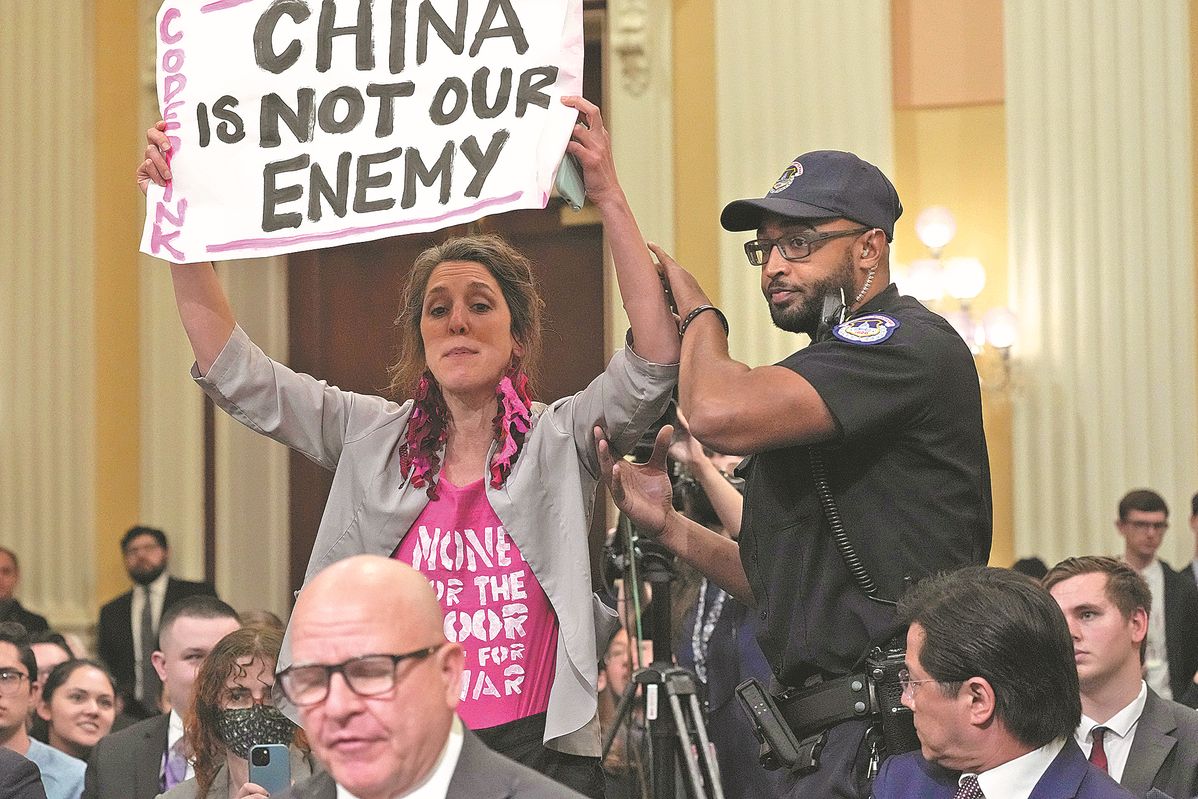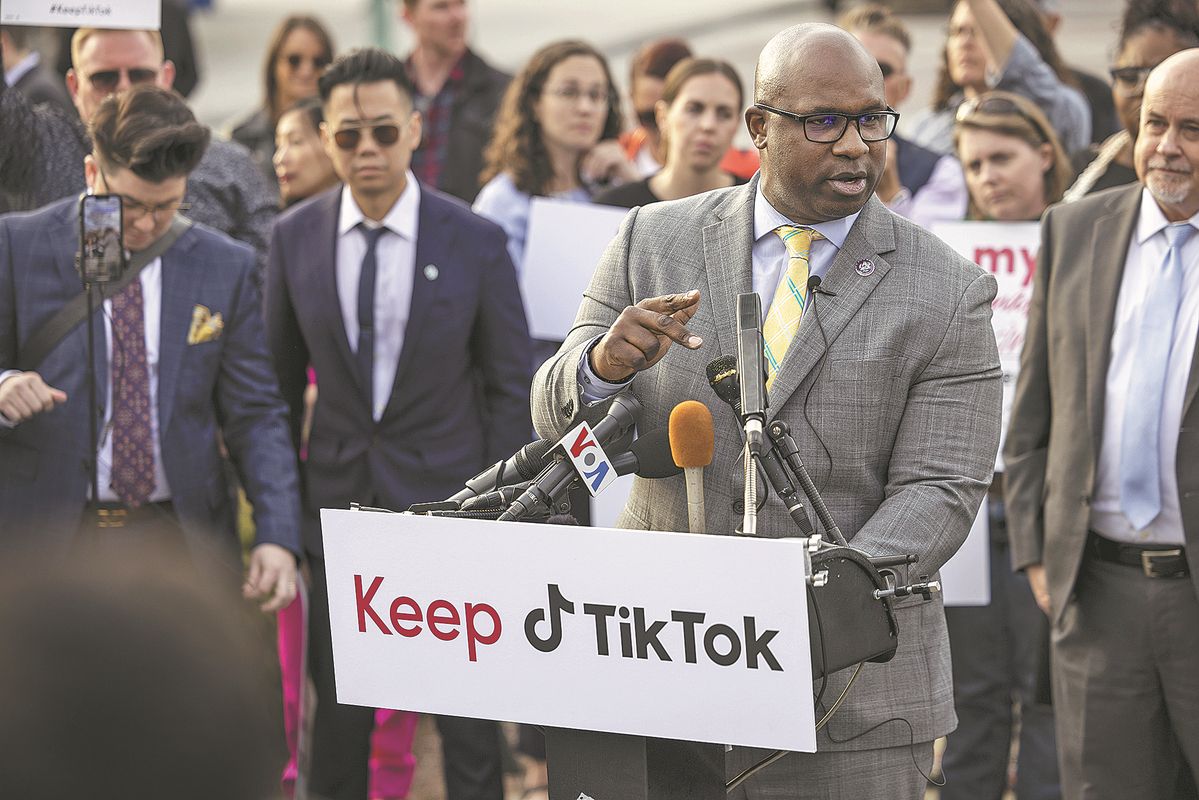
A protester interrupts H.R. McMaster, former national security adviser to former president Donald Trump, as he testifies during the hearing of a special House committee dedicated to countering China, on Capitol Hill in Washington on Feb 28. ALEX BRANDON/ASSOCIATED PRESS
Washington's role of 'selective cooperation' with China condemned
Editor's note: As the US takes multiple measures to contain China's development, the relations between the two countries have reached a low point, prompting observers to call for a reset in their ties, and the need for Washington's active cooperation in science and technology.
Thirty-five years ago, Ben Zhang from eastern China's Jiangsu province went to the United States for education and has since made it his home, founded an import company and become a naturalized US citizen. But he never forgot his roots, fervently hoping the two countries build an enduring friendship and cooperation.
Zhang, founder of Greater Pacific Industries, headquartered in Seattle, Washington state, a supplier to the advertising industry, said the current relationship between China and the US is "not healthy".
"Current Sino-US relations experience a lot of tension and back-and-forth political maneuvering that make day-to-day business tough," Zhang said. "Although I am a US citizen and our company is an American company, our 28-year history is rooted in China where we have many long-term partnerships with great vendors. My hope is for the restoration of normal economic, trade, and diplomatic relations between the two countries."
In the past few years, the Sino-US relationship has reached its lowest point since the establishment of diplomatic ties, as the US has taken measures in multiple fields to contain China's development, such as unilaterally initiating "trade wars" and promoting decoupling from China, said He Yun, an associate professor in the School of Public Administration at Hunan University in Changsha.
These moves not only slowed down the economic and social development on both sides but also disrupted the normal pace of the world economy, she said.
Zhang said that economic competition is generally good for prices and innovation, but it has to be healthy competition, otherwise, it will not only harm the two countries' economies but also the neighboring countries' economies. For instance, the Donald Trump administration imposed tariffs on many Chinese-made goods back in 2018, essentially creating "a trade war".
"Politically this was done to challenge China, but it benefits no one, as US consumers ultimately pay the cost of the tariffs. Additionally, the tariffs act like a tax on the world economy, pushing up inflation and higher consumer products prices worldwide," he said.
Zhang said his company used to import all the advertising promotional products and consumer products from thousands of suppliers throughout China, but after the US imposed tariffs on Chinese goods, he had to purchase about 30 percent from countries outside China, such as Vietnam and Cambodia.
"Last year we had some hope the new administration would roll back some or all of these tariffs, but this still has not happened and seems not happening anytime soon, which is very disappointing," he said.
"These factors all pose challenges for our business model," said Zhang. "We are more familiar with Chinese culture, markets, ports, and infrastructure. In addition, the China market offers huge potential for foreign companies. The buying power of China's middle class is massive. There is so much potential to grow our business with China and expand partnerships there. This is much more attractive than more risky sources outside China."
Since the beginning of this year, a series of visits by high-ranking US officials were expected to bring hope for the recovery of bilateral relations, including those of US Secretary of State Antony Blinken, US Treasury Secretary Janet Yellen, and US Presidential Special Climate Envoy John Kerry.
During the recent visit of US Secretary of Commerce Gina Raimondo to China, both countries took significant steps toward improving their bilateral relations. They announced the establishment of new communication channels, a working group to address trade disputes, and an exchange of export control information to enhance transparency.
China's central bank said on Friday that China and the US will establish two working groups — the Economic Working Group and the Financial Working Group — to strengthen communication on economic and financial matters.

US congressman Jamaal Bowman speaks as TikTok content creators gather outside the Capitol to voice their opposition to a potential ban on the app in Washington on March 22. NATHAN POSNER/GETTY IMAGES
Reassessing strategy
"The gesture shows that America has been reassessing its detrimental China strategy," He Yun said. After all, regardless of whether the US wants it or not, China has already become the world's top manufacturing country, and it's impossible for the US enterprises to rearrange their locations in the short term, she said.
The US' imports from China shrank after tariffs and sanctions were introduced five years ago — the US efforts to shift trade to its allies had some results. However, trade between US allies and China is rising, "suggesting that they are often acting as packaging hubs for what, in effect, remain Chinese goods," said the British weekly The Economist.
In the past five years, the return rate of FDI in China reached 9.1 percent, and in the first half of this year, 24,000 foreign-invested firms were established in China, and investment from France, the UK and Japan in the same period went up 173 percent, 135 percent and 53 percent, respectively, according to official figures.
Kenneth Pomeranz, a professor of Modern Chinese History at the University of Chicago, said that at this point, the relationship is so bad that almost any high-level contact is a good thing; so is the establishment of more communication channels.
Diao Daming, a professor at the School of International Studies at Renmin University of China, said the trend of accelerated and positive dialogue between high-level officials of China and the US has continued since this May.
"It can be said that, at least in areas of common interest in the economic and trade fields, both the US and China now hope to avoid a worsened situation and minimize losses, and based on that, could even improve the current situation," he said.
The US attitude toward China has become quite clear: it wants a kind of selective cooperation. In certain areas where they think cooperating with China benefits the US, they will engage. In other areas where they believe working with China may impact their so-called competitiveness, they will avoid cooperation, claiming it carries risks, Diao said.
"This selective and unilateral approach is completely self-centered and presumptuous," he said. "China has always emphasized mutual respect, peaceful coexistence, and win-win cooperation. But the US tries to unilaterally determine how to cooperate and in which areas to cooperate, which is a complete lack of mutual respect."
Diao said that the US' unilateral actions driven by a pursuit of its own maximum interests, are the main reasons for the current state of Sino-US relations. Even when the US emphasizes cooperation, it is not an equal and mutually respectful partnership that will lead to a win-win outcome.
Edward Tse, founder and CEO of Gao Feng Advisory Company, said that despite the US government's efforts to decouple from China in recent years, big US companies have not fully followed this strategy, largely due to the importance of the Chinese market and their existing investments in the country.
After the COVID-19 pandemic this year, entrepreneurs such as Microsoft co-founder Bill Gates, and Tesla CEO Elon Musk openly visited China, and many low-profile entrepreneurs have also come. For many multinational corporations, China is still crucial. So, even though the US government talks about decoupling from China and limiting supply chain networks to allies and friendly countries, many large companies are quietly opposing it.
Tse said the US government's attempts to rally its allies against China have also faced challenges, as there are voices both in Europe and elsewhere that are not willing to blindly align with the US in confronting China. Moreover, the rapid rise of the Global South, the strengthening of BRICS, and China's extensive relationships with Africa all demonstrate China's growing importance in the Global South.
"Therefore, I believe that after a few years, the US will realize that it cannot contain China's development and must reach some level of compromise, or at least maintain communication with China," he said.

US Senate Majority Leader Chuck Schumer speaks alongside a bipartisan group of senators after the passage of the CHIPS Act at the Capitol in Washington on July 27 last year. SAUL LOEB/AFP
'Chaotic political arena'
Tse said the US political arena, with divided and chaotic viewpoints, currently lacks serious thinking about what stance it should adopt toward China. "The idea of decoupling or de-risking is considered impossible," he said.
He said that global companies have already experienced the process of globalization, with interdependence being an undeniable reality. The global trend is for countries to embrace globalization and interconnectedness. "It is impossible to exclude China from the global industrial and supply chains. Suppressing and containing China's development is futile," he said.
Diao Daming said that though US officials' visits have had positive implications, the effect is still limited, and is not sufficient to restore normalcy in China-US relations.
"As China has repeatedly emphasized, for Sino-US relations to truly return to the right track, it is necessary to uphold the principles of mutual respect, peaceful coexistence, and win-win cooperation. However, it appears that there is still some distance to go at present," he added.
He Yun said that amid deteriorating relations and poor communication at the top, the Biden administration has shown no signs yet of relenting in its crackdown on China in the areas of technology and trade. US President Joe Biden signed an executive order in August, limiting US investments in advanced technology industries in China.
"The US is also unwilling to give up unfair and unreasonable economic and trade measures such as tariffs imposed on China," she said. "The two sides still have a long way to go before the overall turnaround of China-US relations can be realized."
During her visit, Raimondo voiced Washington's willingness to strengthen cooperation with China on artificial intelligence, climate change, and combating fentanyl. She also reiterated the pledge that the US does not seek to decouple from China or hold China's economy back.
"The US side should live up to its words, rather than say one thing and do another," He Yun said.
编辑:贾方